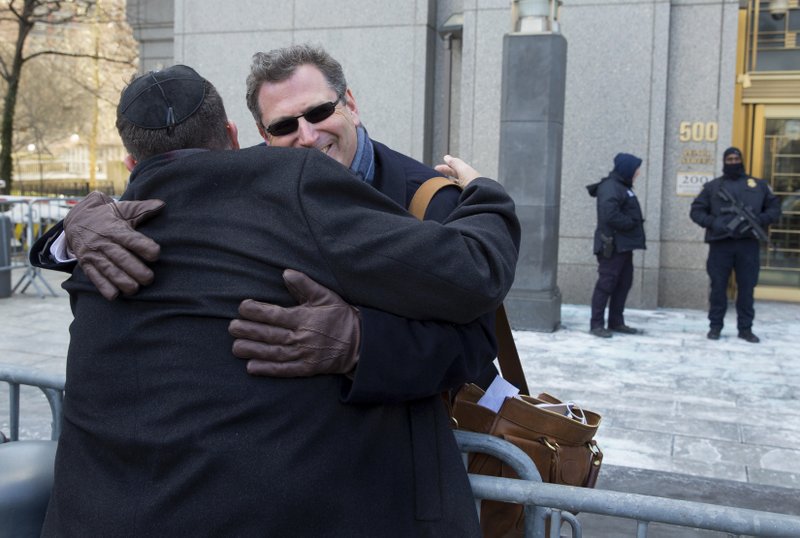NEW YORK -- The Palestine Liberation Organization and the Palestinian Authority backed a series of terrorist attacks in the early 2000s in Israel that killed or wounded several Americans, a U.S. jury found Monday in awarding hundreds of millions of dollars in damages at a civil trial.
In finding the Palestinian entities liable in the attacks, jurors awarded the victims $218.5 million in damages for the bloodshed that killed 33 people and wounded hundreds more -- damages their lawyers said would automatically be tripled under the U.S. Anti-Terrorism Act.
The case in Manhattan and another in Brooklyn have been viewed as the most notable attempts by U.S. victims of the Palestinian-Israeli conflict to use U.S. courts to seek damages that could reach into the billions of dollars.
The Palestinian Authority, which had argued that the attackers acted on their own, said it would appeal.
"The charges that were made against us are baseless," Deputy Minister of Information Mahmoud Khalifa said in a statement.
None of the victims or their relatives were in the courtroom Monday for the verdict, but their lawyers called it a victory in the fight against terrorism.
"It's about accountability. It's about justice," attorney Kent Yalowitz said. He and an attorney with the Shurat HaDin Law Center, also called the Israel Law Center, vowed to collect the damages by pursuing Palestinian Authority and Palestine Liberation Organization bank accounts, securities accounts, real estate and other property that may be in the U.S., Israel and elsewhere.
"Now, the PLO and the Palestinian Authority know there is a price" for supporting terrorism, attorney Nitsana Darshan-Leitner said.
Palestinian officials have been closely watching the case. The verdict could hamper their campaign for international recognition of their independence in the absence of a peace deal with Israel, and the damages could be a financial blow to the cash-strapped Palestinian Authority, which administers parts of the West Bank.
"The decision is a tragic disservice to the millions of Palestinians who have invested in the democratic process and the rule of law in order to seek justice and redress their grievances, and to the international community" in working toward a solution to the Israeli-Palestinian conflict, Khalifa said.
The suit against the Palestine Liberation Organization and Palestinian Authority -- as well as the Brooklyn case against the Jordan-based Arab Bank -- had languished for years as the defendants challenged the U.S. courts' jurisdiction. Recent rulings found that they should go forward under the Anti-Terrorism Act, which allows victims of U.S.-designated foreign terrorist organizations to seek compensation for pain and suffering, loss of earnings and other hardship.
The Palestinian case concerned attacks in 2002 and 2004, during the second Palestinian uprising. They included suicide bombings, shootings on busy streets and a bombing at a packed cafeteria at Jerusalem's Hebrew University. Overall, the second uprising killed about 3,000 Palestinians and more than 1,000 Israelis.
Jurors heard testimony from relatives of people killed and survivors who never fully recovered. One, Rena Sokolov, described how a family vacation to Israel in 2002 turned to tragedy with a bomb blast outside a Jerusalem shoe store.
The Long Island woman testified that she felt like she "was in a washing machine," and blood flowed so quickly from a broken leg that she thought she would die.
The plaintiffs also relied on internal records showing the Palestinian Authority continued to pay the salaries of employees who were put behind bars in terror cases and paid benefits to families of suicide bombers and gunmen who died committing the attacks.
"Where are the documents punishing employees for killing people?" asked Yalowitz, who had urged jurors to award $350 million. "We don't have anything like that in this case."
Defense attorney Mark Rochon had argued there was no proof that Palestinian authorities sanctioned the attacks as alleged in the lawsuit, brought by 10 American families. Members of the Palestinian security forces were convicted in Israeli courts on charges that they were involved.
"What they did, they did for their own reasons ... not the Palestinian Authority's," he said, arguing that it was illogical to conclude that payments made after the attacks motivated the attackers in the first place.
Last year, a Brooklyn jury decided that Arab Bank should be held responsible for a wave of Hamas-orchestrated suicide bombings based on claims that the financial institution knowingly did business with the terror group.
A separate phase of the Brooklyn trial dealing with damages, set to begin in May, will include testimony from victims.
A Section on 02/24/2015

